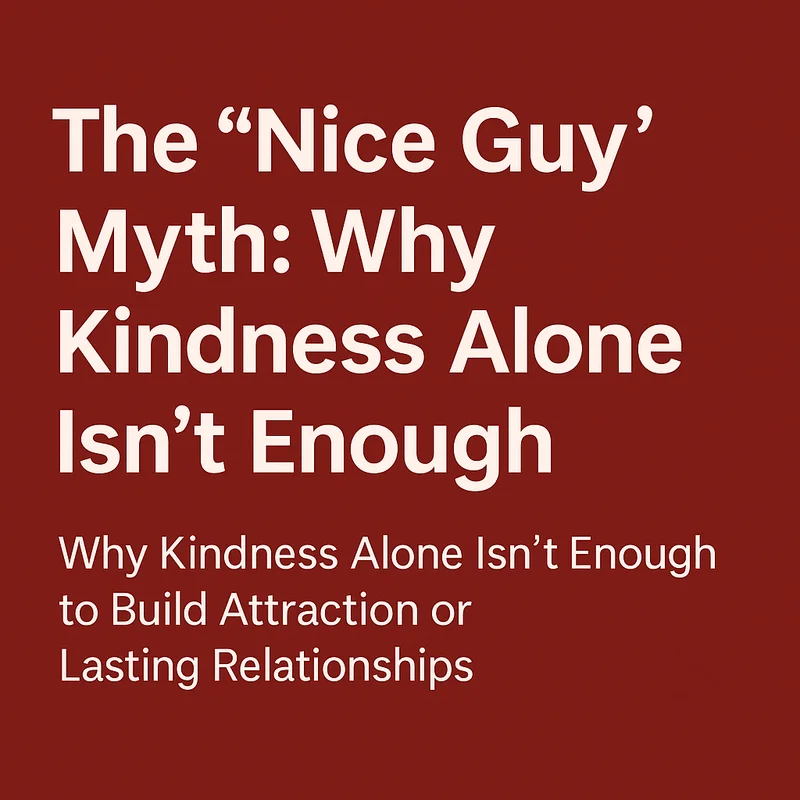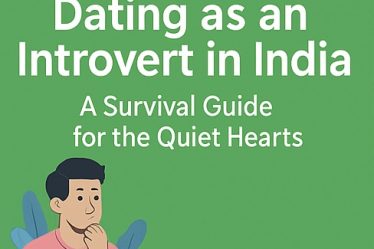
You’re thoughtful, respectful, always there when she needs you — and yet, she still doesn’t choose you. If you’ve ever found yourself wondering, “Why do women always go for the wrong guys when I treat them right?”, you might be caught in the “Nice Guy” trap.
The “Nice Guy” myth suggests that being kind, agreeable, and available should automatically make someone fall in love with you. But kindness — while important — is not enough on its own to spark genuine attraction or maintain a healthy relationship. In this article, we’ll explore what the “Nice Guy” myth really means, why it backfires, and what actually makes a man emotionally attractive.
What Is the ‘Nice Guy’ Myth?
At the core of the “Nice Guy” myth lies a faulty belief: that being nice should earn romantic rewards. This idea is built on a transactional mindset — “If I’m kind and supportive, then I deserve love in return.”
But love doesn’t work that way.
The “Nice Guy” archetype isn’t just about kindness — it’s often about suppressing emotions, avoiding conflict, and hiding true feelings to gain approval. In reality, many “Nice Guys” are disconnected from their own desires, hoping that being agreeable will make them lovable.
Common signs of the Nice Guy mindset:
- Believing women owe you affection for being kind
- Avoiding conflict or difficult conversations
- Prioritizing others to the point of self-neglect
- Feeling resentful when efforts aren’t reciprocated
- Acting selflessly but expecting emotional payoff
Why Being ‘Too Nice’ Can Be a Turn-Off
Contrary to what you might believe, being too nice can actually repel people — not attract them. That’s because over-niceness often signals insecurity, neediness, or a fear of being rejected.
Kindness, when it comes from a place of strength, is attractive. But kindness fueled by low self-esteem or the need for validation feels clingy, manipulative, or emotionally heavy.
Here’s why excessive niceness backfires:
- Lack of boundaries: Always saying yes makes you look like a pushover.
- Emotional dependence: Constantly needing reassurance drains others.
- Hidden motives: People sense when kindness comes with strings attached.
- Avoidance of authenticity: Being overly agreeable feels fake or inauthentic.
The Science of Attraction: What Really Creates Connection
Studies show that people are drawn to emotional strength, authenticity, and healthy self-esteem — not just pleasant behavior.
Traits that genuinely attract others:
- Confidence: Not arrogance — but self-assuredness and belief in yourself.
- Emotional intelligence: The ability to connect, listen, and communicate.
- Purpose: A sense of drive or passion beyond the relationship.
- Boundaries: Knowing what you will and won’t tolerate.
While kindness is still a valued trait, it needs to be part of a fuller emotional identity that includes strength, independence, and clarity.
How ‘Nice Guys’ Sabotage Their Own Relationships
The tragedy of the Nice Guy isn’t that he’s nice — it’s that he uses niceness to avoid discomfort, assertiveness, and emotional honesty.
Self-sabotaging behaviors include:
- Passive-aggressiveness: Bottling up needs leads to indirect hostility.
- Silent expectations: Expecting love without asking for what you want.
- Guilt-tripping: Making the other person feel bad for not responding.
- Martyrdom: Sacrificing yourself, then resenting it later.
These behaviors eventually erode trust, create emotional pressure, and push partners away.
From ‘Nice Guy’ to Good Man: Embracing Healthy Masculinity
There’s nothing wrong with being kind — the problem lies in how it’s expressed. Healthy masculinity means showing kindness with strength, not instead of it.
How to break free from the Nice Guy cycle:
- Recognize the pattern — Admit when you’re using kindness to avoid rejection.
- Learn to say no — Honoring your own needs builds respect.
- Set boundaries — Teach people how to treat you by modeling self-respect.
- Express your desires — Don’t hide behind politeness. Speak up.
- Invest in purpose — Build a life that isn’t centered around being liked.
A “good man” knows how to be loving without being a doormat. He respects others and himself.
Real Kindness Is Rooted in Wholeness
Genuine kindness is attractive — not because it’s “nice,” but because it’s real. It comes from emotional maturity, confidence, and clarity.
When you’re authentic — when your kindness isn’t a mask — people feel safe, seen, and respected. That’s the kind of connection that leads to lasting relationships.
Conclusion
Being a “Nice Guy” isn’t about being too good — it’s about using goodness as a strategy to be loved. That strategy doesn’t work, because it isn’t rooted in authenticity, strength, or true emotional intimacy.
You don’t need to stop being kind. You need to grow into the kind of man who is kind because he’s confident, honest, and emotionally grounded. That’s what truly creates attraction — and keeps it alive.
FAQs
Q1. Is it bad to be a nice guy in relationships?
A: No, being nice isn’t bad — but when niceness is used to avoid rejection or buy affection, it becomes manipulative. Real kindness, paired with self-respect and emotional honesty, is powerful.
Q2. Why do “nice guys” often get friendzoned?
A: Because many “nice guys” fail to express attraction confidently and assertively. They try to earn love through passive kindness rather than creating genuine romantic chemistry.
Q3. How can I stop being a Nice Guy and still be kind?
A: Start by being honest about your needs, setting boundaries, and embracing rejection as a part of life. Practice confidence and emotional strength — kindness will then come from authenticity, not fear.
Q4. Do women prefer bad boys over nice guys?
A: Not necessarily. Women are drawn to confidence, assertiveness, and emotional intelligence. If “nice guys” lack those traits, they may lose out — not because they’re nice, but because they’re emotionally unavailable or insecure.
Q5. What’s the difference between a good man and a Nice Guy?
A: A good man is kind, grounded, emotionally honest, and respects himself and others. A Nice Guy often uses kindness as a way to get approval, avoids conflict, and suppresses his own needs.



